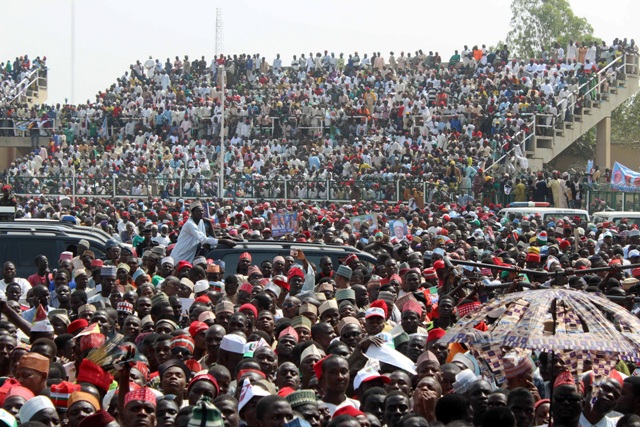 President Buhari with supporters. This article explores Nigeria’s hegemonic ambition in Africa and the complexities on the way [photo: Flikr: Nigeria President]
President Buhari with supporters. This article explores Nigeria’s hegemonic ambition in Africa and the complexities on the way [photo: Flikr: Nigeria President]
[Excerpt from an article which appears in the latest edition of The Round Table: The Commonwealth Journal of International Affairs]
To sustain its predominance and maintain the consent of the other countries, the aspiring state often deploys a number of subtle and humanitarian diplomatic toolkits. In the context of Nigeria, for instance, Uhomoibhi and Saliu identify these altruistic efforts to include leadership for regional organisations, democracy promotion activities, peace support operations, development assistance, providing relief in the event of hunger and starvation, natural disasters and epidemics, trade relationships, contribution of funds to finance the global agenda, among others. With specific reference to the United States, particularly after 1945, the altruistic components of its foreign policy include being the world’s policeman, maintaining trading partners, crafting and maintaining liberal international economic regimes, and providing investments, aid, grants and loans. If hegemony is de fined as a strategy to be pursued by a country, then the subtle efforts above appear vital to its realisation. The hegemonic stability theory, in particular, ‘owes much to the realist tradition of international relations’. Although the classic realist framework does not align with the moralistic approach to international relations, many contemporary foreign policy theorists attribute a level of ethical obligation or altruism to the pursuit of a state’s national. The importance of altruism in international relations theory is based on its usefulness to project other subtle diplomatic means of furthering a nation’s hegemonic interest aside from war or the application of force.
Dominant Explanations for Nigeria’s Hegemonic Interest in Africa
The pursuit of Nigeria’s African policy is anchored on certain dominant planks. The policy has its roots in the country’s perception of the region as a sphere of interest and Nigeria’s immense power resources. These policy underpinnings are investigated next.
National Role Conception
Nigeria’s regionally inclined role conception has led to the policy-makers’ designation of Africa as the country’s sphere of interest and encouraged activist involvement in African issues generally. Nigeria has always preferred to approach its African diplomacy ‘with a national mind-set inclined towards the idealisation of its entitlement to a leadership role’. With respect to history, Nigeria’s focus on Africa dates back to 1960 when the country gained political independence from Britain. Akinterinwa adds weight to this thinking when he notes that the ruling elite who succeeded the departing colonialists wanted ‘Nigeria to be Africa’s leader and also an African leader to be reckoned with in global affairs’. This is what Professor Bolaji Akinyemi refers to as Nigeria’s ‘mega syndrome’ in Africa. The major events which took place at that time offer valuable insights into this foreign policy pursuit. For instance, Nigeria’s foreign affairs minister, Dr Jaja Nwachukwu, while addressing the 16th Session of the United Nations General Assembly in New York on 10 October 1961, clearly articulated the factors that made Nigeria’s African focus imperative. These include:
- The concept that Nigeria was an African country and therefore part and parcel of the continent;
- the idea that Nigeria was independent in everything but neutral in nothing that affected Africa;
- and the fact that Nigeria shared in the peace and tribulations of Africa.
To demonstrate this, Nigeria expressed dissent to French atomic tests in the Reggane area of the Sahara Desert in February, April and December 1960. While both Nigeria and Ghana officially objected, Nigeria went further to risk its diplomatic relations with France in1961. For operational effects, Nigeria’s leadership aspirations continentally have been etched in Section 19 of the 1999 constitution of the Federal Republic of Nigeria as amended. Again, the policy document on Nigeria’s Vision 20:2020 emphasises the sustenance of Nigeria’s leading role in Africa and its position as the foremost black nation in the world. As argued by Ajayi, it does not matter what administration is in place; commitment to Africa is a permanent policy of the Nigerian state. This national role conception notwithstanding, the internal policy environment has failed adequately to support it. Uhomoibhi identifies the major issues hampering Nigeria’s African policy as including the disconnect between the public and foreign policy-making process and the lack of a coherent policy framework. The lack of appropriate focus and the failure to define concretely what Nigeria wants from Africa have subjected Nigeria’s actions to undue idealism.
While Nigeria has continued to demonstrate its relevance continentally and globally, Gambari opines that the absence of a dynamic and result-oriented foreign policy would continue to render such huge contributions largely ineffective. Nigeria’s African diplomacy is the ‘worst reflection of the apparent lack of coordination in the formulation and execution of Nigerian foreign policy’. Akinyemi observes that Nigeria’s mega syndrome in Africa has not produced a consensus around what policies to be pursued to actualise it. This explains why Nigeria has been described as a ‘statistical hegemon’ whose influence derives more from the statistics in its favour relative to other countries in Africa than any proactive strategic engagement.
These policy issues call for attention.



